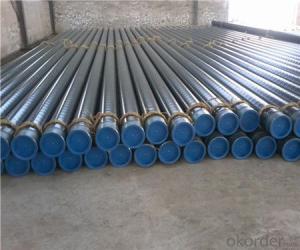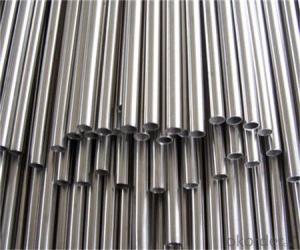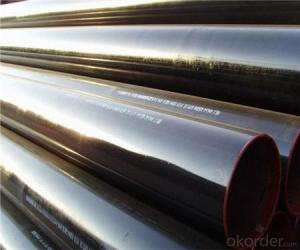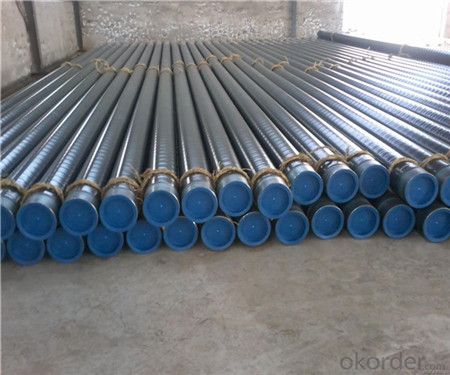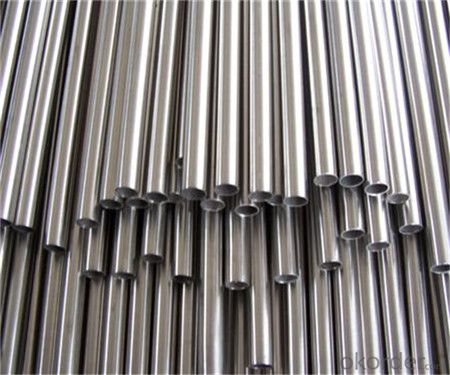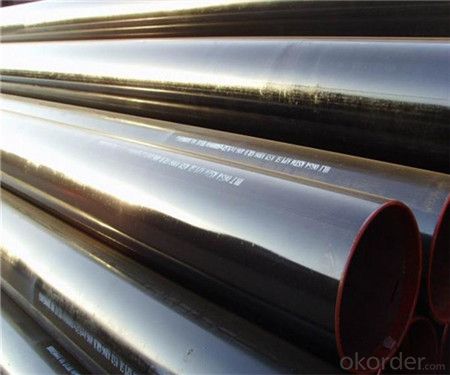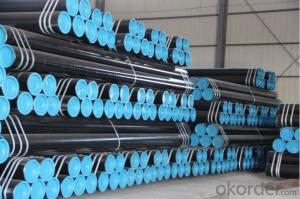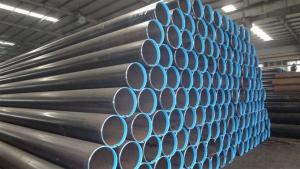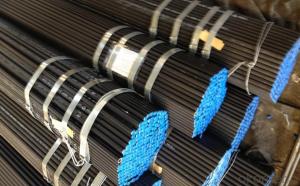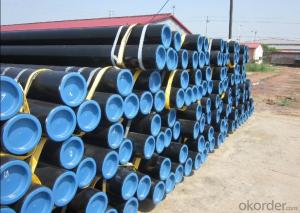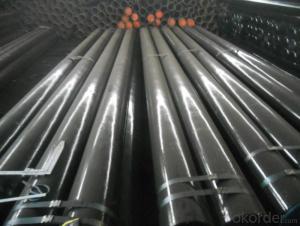Seamless Steel Pipe High Quality/Best Price with API 5L
- Loading Port:
- Tianjin
- Payment Terms:
- TT OR LC
- Min Order Qty:
- 25 m.t.
- Supply Capability:
- 20000 m.t./month
OKorder Service Pledge
OKorder Financial Service
You Might Also Like
1、Structure of Seamless Steel Pipe High Quality/Best Price with API 5L:
Seamless pipe is formed by drawing a solid billet over a piercing rod to create the hollow shell. As the manufacturing process does not include any welding, seamless pipes are perceived to be stronger and more reliable. Historically seamless pipe was regarded as withstanding pressure better than other types, and was often more easily available than welded pipe.
2、Seamless Steel Pipe High Quality/Best Price with API 5L Specification:
Standard | GB, DIN, ASTM ASTM A106-2006, ASTM A53-2007 |
Grade | 10#-45#, 16Mn 10#, 20#, 45#, 16Mn |
Thickness | 8 - 33 mm |
Section Shape | Round |
Outer Diameter | 133 - 219 mm |
Place of Origin | Shandong, China (Mainland) |
Secondary Or Not | Non-secondary |
Application | Hydraulic Pipe |
Technique | Cold Drawn |
Certification | API |
Surface Treatment | factory state or painted black |
Special Pipe | API Pipe |
Alloy Or Not | Non-alloy |
Length | 5-12M |
Outer Diameter | 21.3-610mm |
Grade | 20#, 45#, Q345, API J55, API K55, API L80, API N80, API P110, A53B |
Standard | ASME, ASTM |
1) Material:20#(ASTM A 106/A53 GRB.API5LGRB,GB),45#,16Mn,10#.
2) Specification range:OD:21.3-610mm,WT:6-70mm,length:6-12m or according to the requirement of clients.
3) Excutive standards:GB,ASME API5L.ASTM A 106/A53,Despite of the above standards,we can also supply seamless steel pipe with standard of DIN,JIS,and so on,and also develop new products according to the requirements of our clients!
4) Surface:black lacquered,varnish coating or galvanized.
5) Ends:Beveled or square cut,plastic capped,painted.
6) Packing:bundles wrapped with strong steel strip,seaworthy packing.
3、Main Features of Seamless Steel Pipe High Quality/Best Price with API 5L:
• High manufacturing accuracy
• High strength
• Small inertia resistance
• Strong heat dissipation ability
• Good visual effect
• Reasonable price
4、Packaging & Delivery
Packaging Details: | seaworthy package,bundles wrapped with strong steel strip |
Delivery Detail: | 15-30days after received 30%TT |
5、FAQ of Seamless Steel Pipe High Quality/Best Price with API 5L:
①How is the quality of your products?
Our products are manufactured strictly according to national and internaional standard, and we take a test
on every pipe before delivered out. If you want see our quality certifications and all kinds of testing report, please just ask us for it.
Guaranteed: If products’ quality don’t accord to discription as we give or the promise before you place order, we promise 100% refund.
②How about price?
Yes, we are factory and be able to give you lowest price below market one, and we have a policy that “ for saving time and absolutely honest business attitude, we quote as lowest as possible for any customer, and discount can be given according to quantity”,if you like bargain and factory price is not low enough as you think, just don’t waste your time.Please trust the quotation we would give you, it is professional one.
③Why should you chose us?
Chose happens because of quality, then price, We can give you both.Additionally, we can also offer professional products inquiry, products knowledge train(for agents), smooth goods delivery, exellent customer solution proposals.Our service formula: good quality+good price+good service=customer’s trust
SGS test is available, customer inspection before shipping is welcome, third party inspection is no problem.
6、Seamless Steel Pipe High Quality/Best Price with API 5L Images:
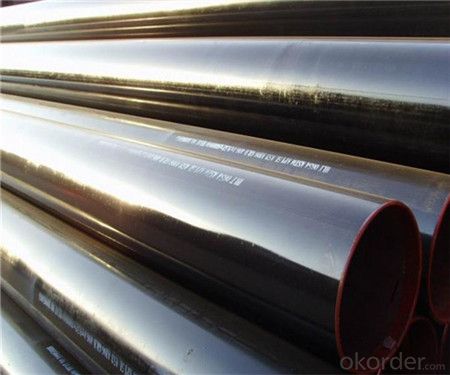
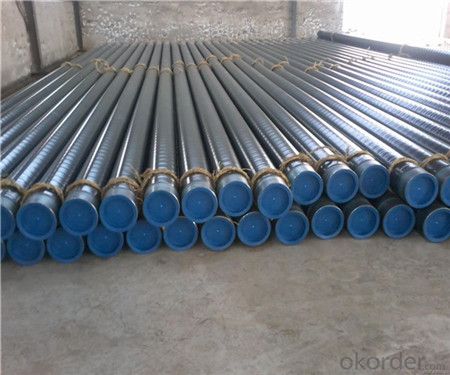
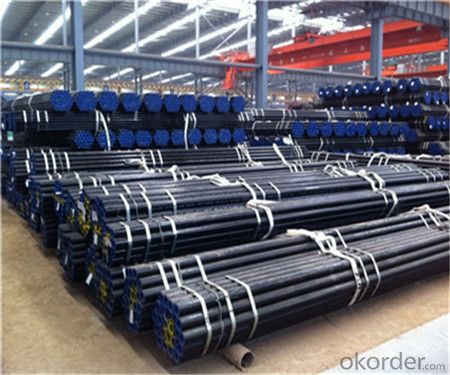
- Q: What are the quality control measures for steel pipe production?
- Quality control measures for steel pipe production typically involve several steps to ensure the final product meets the required specifications and industry standards. These measures may include inspection of raw materials, such as the steel coils or plates, to ensure they meet the required chemical composition and mechanical properties. During manufacturing, various processes like forming, welding, and heat treatment are closely monitored to maintain dimensional accuracy and integrity. Non-destructive testing methods, such as ultrasonic or radiographic inspection, are often employed to detect any defects or anomalies in the pipes. Additionally, visual inspection, surface treatment assessment, and mechanical testing are conducted to assess the overall quality before the pipes are released for distribution.
- Q: How are steel pipes protected against lightning strikes?
- Steel pipes are typically protected against lightning strikes through the use of lightning rods and grounding systems. These measures help to divert the electrical energy from a lightning strike away from the steel pipes, preventing damage or potential accidents.
- Q: How are steel pipes used in hydroelectric power plants?
- Steel pipes are used in hydroelectric power plants to facilitate the transportation of water from the reservoir to the turbines. These pipes are essential for maintaining a steady flow of water, which is crucial for generating electricity through the rotation of turbines. Additionally, steel pipes are employed in the construction of penstocks, which are large pipes directing water towards the turbines, ensuring efficient energy production in hydroelectric power plants.
- Q: What are the different types of steel pipe coatings for underground gas pipelines?
- There are several types of steel pipe coatings used for underground gas pipelines, including fusion bonded epoxy (FBE) coating, three-layer polyethylene (3LPE) coating, and three-layer polypropylene (3LPP) coating. These coatings provide protection against corrosion, abrasion, and other external factors, ensuring the longevity and safety of the gas pipelines.
- Q: How are steel pipes used in the construction of pipelines?
- Steel pipes are commonly used in the construction of pipelines due to their durability, strength, and resistance to corrosion. These pipes are welded together to form a continuous line, allowing fluids or gases to be transported over long distances. The steel pipes are essential for ensuring a reliable and efficient flow of materials, such as oil, gas, or water, in various industries, including oil and gas, water supply, and infrastructure development.
- Q: Can steel pipes be used for electrical conduits?
- No, steel pipes are not typically used for electrical conduits as they are conductive and can pose a safety risk. Electrical conduits are usually made of non-conductive materials such as PVC or metal with insulating coatings.
- Q: Can steel pipes withstand high temperatures?
- Yes, steel pipes can withstand high temperatures. Steel is a strong and durable material that has high heat resistance. It can retain its strength and structural integrity even when exposed to extreme heat, making it suitable for various high-temperature applications such as industrial furnaces, power plants, and steam pipelines.
- Q: What are the different joining methods for steel pipes?
- The different joining methods for steel pipes include welding, threaded connections, flanges, and grooved connections.
- Q: What is the difference between steel pipe and aluminum pipe?
- The main difference between steel pipe and aluminum pipe lies in their composition and physical properties. Steel pipes are primarily made of iron and carbon, with other elements added to enhance their strength and corrosion resistance. On the other hand, aluminum pipes are made entirely of aluminum, which is a lightweight and highly corrosion-resistant metal. One significant distinction between steel and aluminum pipes is their weight. Steel is a denser material compared to aluminum, meaning that steel pipes are generally heavier and sturdier. This characteristic makes steel pipes suitable for applications requiring higher structural strength and load-bearing capabilities. Aluminum pipes, on the other hand, offer distinct advantages due to their lightweight nature. They are around one-third the weight of steel pipes, making them easier to handle, transport, and install. This lightweight property also makes aluminum pipes more suitable for applications where weight reduction is crucial, such as in aerospace and automotive industries. Another crucial aspect to consider is corrosion resistance. Steel pipes are prone to rusting and corrosion, especially when exposed to moisture or corrosive environments. To combat this, steel pipes are often coated with protective layers or galvanized to enhance their resistance to corrosion. Aluminum pipes, on the other hand, have excellent natural corrosion resistance due to the formation of a thin layer of aluminum oxide on their surface. This oxide layer acts as a protective barrier, preventing further corrosion and degradation. Cost is another factor to consider when comparing steel and aluminum pipes. Steel pipes are generally more cost-effective compared to aluminum pipes, primarily due to the lower cost of raw materials and manufacturing processes involved. However, it is essential to consider the specific requirements and durability needed for the intended application, as the long-term maintenance costs and lifespan of steel and aluminum pipes may vary. In summary, the difference between steel and aluminum pipes can be summarized based on their weight, strength, corrosion resistance, and cost. Steel pipes are heavier, stronger, and more prone to rusting and corrosion but are generally more cost-effective. Aluminum pipes are lightweight, corrosion-resistant, and costlier but offer advantages in weight reduction and specific applications where corrosion resistance is crucial. Ultimately, the choice between steel and aluminum pipes depends on the specific needs of the project and the desired properties for optimal performance.
- Q: How are steel pipes used in the petrochemical industry?
- Steel pipes are commonly used in the petrochemical industry for various purposes such as transporting and distributing fluids and gases, as well as providing structural support for equipment. They are particularly preferred due to their high strength, durability, and resistance to corrosion, making them suitable for handling harsh and corrosive substances.
Send your message to us
Seamless Steel Pipe High Quality/Best Price with API 5L
- Loading Port:
- Tianjin
- Payment Terms:
- TT OR LC
- Min Order Qty:
- 25 m.t.
- Supply Capability:
- 20000 m.t./month
OKorder Service Pledge
OKorder Financial Service
Similar products
Hot products
Hot Searches
Related keywords
